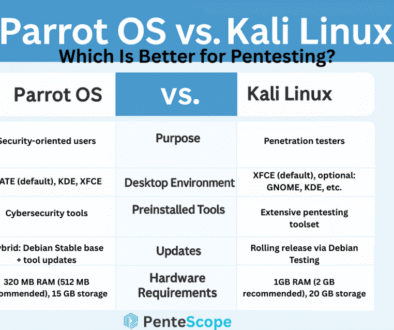Why Junior Pentester Salaries Might Surprise You
Attention, aspiring cybersecurity professionals! Are you considering a career as a junior penetration tester? Prepare to be astonished by the potential of Junior Pentester Salaries in this exciting field. While many assume entry-level positions come with modest paychecks, the world of junior penetration testing might just shatter those expectations.
Imagine earning up to $168,500 annually as a junior penetration tester in the United States. That’s right – the salary range for this role is surprisingly wide, with even the average falling at an impressive $119,895 per year (ZipRecruiter). But what factors contribute to such lucrative compensation? From geographical location to specialized skills, the variables influencing junior pentester salaries are as diverse as the field itself.
In this blog post, we will explore the fascinating world of junior pentester salaries, exploring the role’s responsibilities, surprising salary ranges, and strategies to maximize earning potential. We’ll also uncover the additional benefits of the job and provide insights on how to climb the career ladder in this rapidly evolving industry. Whether you’re a cybersecurity enthusiast or a seasoned professional looking to switch gears, prepare to have your perceptions challenged and your curiosity piqued.
Understanding the Role of a Junior Pentester
Key responsibilities and skills required
A junior penetration tester, also known as a junior pentester, plays a crucial role in enhancing the security of computer networks and systems. Their primary responsibility is to identify and exploit vulnerabilities that malicious actors could target. This involves planning and executing evaluation tests, staying up-to-date with current cybersecurity threats, and developing software to aid in penetration efforts.
Key responsibilities of a junior pentester include:
- Conducting remote or onsite testing of clients’ networks, systems, and applications
- Collaborating with clients to understand their testing needs
- Simulating security breaches to identify vulnerabilities
- Creating new testing methodologies
- Documenting findings and presenting risks to management
- Providing recommendations for security improvements
- Training users to reduce future vulnerabilities
To excel in this role, junior pentesters must possess a specific set of skills and qualifications:
| Skills | Qualifications |
|---|---|
| Strong understanding of systems and networks | Bachelor’s degree in relevant field (e.g., computer science, cybersecurity) – Optional |
| Proficiency in coding (e.g., Python, JavaScript) | Industry certifications (e.g., Certified Ethical Hacker, CREST Registered Penetration Tester) |
| Familiarity with penetration testing tools (e.g., Metasploit, Nmap) | Practical experience in information security |
| Effective communication skills | Federal security clearance (for government-related positions) |
| Creativity and problem-solving abilities | Participation in cybersecurity competitions or bug bounty programs |
| Research capabilities | Continuous professional development |
Typical day-to-day tasks
A junior pentester’s daily routine involves various tasks to identify and address security vulnerabilities. While most work regular hours, there may be occasions when emergency assistance is required to tackle newly discovered threats.
Typical day-to-day tasks include:
- Planning and scoping penetration tests
- Executing security assessments on networks and applications
- Analyzing security measures and policies
- Exploiting identified vulnerabilities in a controlled environment
- Writing detailed security assessment reports
- Evaluating and recommending improvements to existing security protocols
- Collaborating with senior pentesters and mentoring entry-level staff
- Researching and staying informed about emerging cybersecurity threats and tools
- Participating in team meetings and client consultations
Career growth potential
The field of penetration testing offers significant career growth potential for junior professionals. As they gain experience and expertise, junior pentesters can advance to more senior roles with increased responsibilities and higher salaries.
Career progression typically follows this path:
- Junior Penetration Tester
- Penetration Tester
- Senior Penetration Tester
- Team Lead or Consultant
Salaries increase correspondingly with career advancement:
| Career Level | Salary Range (USD) |
|---|---|
| Entry-level | $60,000 – $80,000 |
| Experienced | $80,000 – $100,000 |
| Senior | $100,000 – $130,000+ |
Additionally, penetration testers can explore related career paths within the cybersecurity field, such as:
- Cybersecurity Analyst
- Incident Responder
- Security Consultant
- Information Security Manager
To maximize career growth, junior pentesters should focus on continuous learning, obtaining relevant certifications, and gaining hands-on experience through internships, competitions, and networking opportunities. The dynamic nature of the cybersecurity field ensures that there are always new challenges and opportunities for professional development.
Factors Influencing Junior Pentester Salaries
As we have earlier explored the role of a Junior Pentester, it’s crucial to understand the various factors that influence their salaries. These factors can significantly impact earning potential and career growth in cybersecurity.
Industry demand for cybersecurity professionals
The cybersecurity industry is experiencing unprecedented growth, driven by the increasing need for organizations to protect their digital assets. According to the U.S. Bureau of Labor Statistics, there’s a projected 33% growth in information security analyst jobs from 2023 to 2033. This translates to approximately 17,300 annual job openings, indicating a robust demand for skilled professionals (U.S. Bureau of Labor Statistics).
CyberSeek’s report highlights a significant labor shortage, with over 572,000 job vacancies in the field between September 2022 and August 2023. This high demand directly influences Junior Pentester salaries, as companies compete to attract and retain talent in a market with a limited pool of qualified professionals.
Geographic location and cost of living
Salaries for Junior Pentesters can vary based on geographic location and associated cost of living. Top-paying states for cybersecurity professionals include:
| State | Median Annual Salary |
|---|---|
| California | $100,000+ |
| New York | $100,000+ |
| Washington | $100,000+ |
| Alaska | $60,000 – $70,000 |
| Wyoming | $60,000 – $70,000 |
Cities like Washington, D.C., and New York are known to offer competitive salaries due to high demand and increased cost of living. Junior Pentesters should consider these geographical differences when evaluating job offers and career opportunities.
Company size and type
The size and type of company employing a Junior Pentester can significantly impact salary. Large tech companies, such as Google, tend to offer higher salaries, with cybersecurity analysts at these firms earning an average of $160,461 annually. In contrast, healthcare and government roles typically offer lower yet still competitive wages.
Company size often correlates with available resources and the complexity of security needs, which can influence salary structures. Startups might offer lower base salaries but compensate with equity or other benefits, while established corporations may provide higher salaries and more comprehensive benefits packages.
Educational background and certifications
Certifications and educational qualifications play a crucial role in determining Junior Pentester salaries:
Educational background:
- Analysts without a degree: $61,000 – $65,000
- Analysts with a bachelor’s degree: $65,500 – $67,500
While a degree can be advantageous, it’s not strictly necessary for all positions. Some roles accept associate degrees or relevant experience as alternatives.
Certifications:
Obtaining industry-recognized certifications can significantly enhance earning potential. Certifications such as Certified Information Systems Security Professional (CISSP) and Certified Ethical Hacker (CEH) are highly valued in the field and can lead to salary increases.
Cybersecurity bootcamps have also emerged as an alternative path for skill acquisition which allow professionals to enter the field without pursuing a full degree. These programs can provide a foundation for entry-level positions and serve as a stepping stone for further career development.
The cybersecurity world is always changing, and keeping up through education and certifications is a must for growing your career and increasing your salary. If you’re a junior pentester, staying on top of the latest tools, technologies, and threats can make all the difference in reaching your earning potential.
Surprising Salary Ranges for Junior Pentesters
Entry-level salary expectations
The salary expectations for junior pentesters might come as a pleasant surprise to many aspiring cybersecurity professionals. As of December 2024, the average annual salary for an entry-level penetration tester in the United States is approximately $119,895. This translates to:
- Hourly rate: $57.64
- Weekly earnings: $2,305
- Monthly income: $9,991
However, it’s important to note that there’s a significant range in salaries, with figures spanning from $22,500 to $168,500 annually. Most entry-level penetration testers can expect to fall within the following percentiles:
| Percentile | Annual Salary |
|---|---|
| 25th | $96,000 |
| 50th | $119,895 |
| 75th | $141,000 |
| 90th | $158,500 |
This wide range suggests ample opportunities for salary growth based on factors such as skill level, geographic location, and experience.
Comparison to other IT roles
The figures are quite competitive when comparing junior pentester salaries to other entry-level IT positions. Interestingly, some related entry-level positions, particularly in cloud computing, tend to offer even higher salaries. Entry-level cloud computing roles pay approximately 9.1% more than the average for entry-level penetration testers.
Here’s a comparison of average salaries for different experience levels in penetration testing:
| Experience Level | Average Annual Salary |
|---|---|
| Entry-level | $72,823 |
| Early career | $91,484 |
| Late career | $145,501 |
It’s worth noting that these figures may vary depending on the source and timeframe of the data collection.
Potential for rapid salary growth
One of the most exciting aspects of a career in penetration testing is the potential for rapid salary growth. As professionals gain experience and expertise, their earning potential increases significantly. The cybersecurity skills gap, with projections of 3.5 million unfilled positions by 2025, contributes to this growth potential.
Salary progression based on experience:
- Entry-level testers: $76,042
- Mid-level testers: $108,860
- Senior-level professionals: $133,759+
- Top earners: Exceeding $200,000
Factors contributing to rapid salary growth include:
- Increasing demand due to escalating cyber threats
- The global cost of cybercrime is expected to reach $10.5 trillion by 2025
- Opportunities to specialize in high-demand areas
- Acquisition of advanced certifications and skills
With this potential for substantial salary increases, junior pentesters can look forward to a financially rewarding career path as they gain experience and expertise in the field.
As we move to the next section on “Additional Compensation and Benefits,” it’s important to recognize that while base salary is a significant factor, it’s not the only component of a junior pentester’s overall compensation package.
Additional Compensation and Benefits
In this section we will consider the additional compensation and benefits that often accompany the position. These extras can significantly enhance the overall value of a junior pentester’s compensation package.
Performance Bonuses and Profit Sharing
Many cybersecurity firms recognize the importance of incentivizing their employees to deliver exceptional results. As such, junior pentesters may be eligible for performance-based bonuses or profit-sharing schemes. These additional financial rewards can substantially boost a pentester’s annual earnings.
| Benefit Type | Description | Potential Impact |
|---|---|---|
| Performance Bonuses | Financial rewards based on individual or team achievements | Can increase annual earnings by 5-15% |
| Profit Sharing | Distribution of company profits to employees | May provide additional 2-10% of base salary |
Professional Development Opportunities
The rapidly evolving nature of cybersecurity demands continuous learning and skill enhancement. Many employers offer professional development opportunities as part of their benefits package, which can significantly impact a junior pentester’s career progression and earning potential.
Certifications and Training Programs
Some organizations often sponsor or reimburse employees for relevant certifications and training programs. These educational benefits improve the pentester’s skills and increase their value in the job market, potentially leading to higher salaries in the future.
Conference Attendance and Networking Events
Employers frequently encourage and support participation in industry conferences and networking events. These opportunities allow junior pentesters to stay current with the latest trends, technologies, and best practices in cybersecurity while also expanding their professional network.
Flexible Work Arrangements
The cybersecurity field often lends itself to flexible work options, which can be considered a valuable non-monetary benefit. Many organizations offer:
- Remote work options
- Flexible schedules
- Project-based work arrangements
These flexible arrangements can improve work-life balance and increased job satisfaction, which are important factors in overall career contentment and longevity.
Health and Wellness Perks
In addition to competitive salaries, many organizations in the cybersecurity sector provide comprehensive health and wellness benefits. These may include:
- Health, dental, and vision insurance
- Mental health support services
- Wellness programs and gym memberships
- Paid time off and sick leave
These benefits contribute to the overall well-being of junior pentesters which allow them to focus on their work without worrying about healthcare costs or work-life balance issues.
As we’ve seen, the compensation package for junior pentesters extends far beyond the base salary. These additional benefits and perks can significantly enhance the overall value of a position and contribute to long-term career satisfaction. With this comprehensive understanding of compensation and benefits, we can now explore strategies to maximize earning potential as a junior pentester, which will be covered in the next section.
Strategies to Maximize Earning Potential as a Junior Pentester
Continuous Skill Development
In the rapidly evolving world of cybersecurity, continuous skill development is crucial for junior pentesters to enhance their earning potential. The field demands professionals who can adapt to new technologies and threats. To stay competitive and increase salary prospects, junior pentesters should:
- Regularly update knowledge of hacking tools and techniques
- Develop proficiency in programming languages relevant to cybersecurity
- Enhance understanding of various operating systems
- Improve communication skills for effective reporting
By focusing on these areas, junior pentesters can position themselves for higher-paying roles and accelerate career progression.
Networking and Building Professional Relationships
Networking plays a vital role in maximizing earning potential for junior pentesters. Building professional relationships can lead to:
- Access to higher-paying job opportunities
- Insights into industry trends and salary benchmarks
- Potential collaborations and freelance projects
Attending cybersecurity conferences, participating in online forums, and joining professional associations can significantly expand a junior pentester’s network, potentially leading to more lucrative career opportunities.
Pursuing Relevant Certifications
Certifications are a key factor in increasing salary potential for junior pentesters. Obtaining industry-recognized certifications can lead to substantial salary increases and improved job prospects. Some valuable certifications include:
| Certification | Potential Salary Impact |
|---|---|
| Certified Ethical Hacker (CEH) | Significant boost in income prospects |
| Offensive Security Certified Professional (OSCP) | Highly valued, can lead to higher salaries |
| Certified Information Systems Security Professional (CISSP) | Average salary increase of approximately $19,000 |
Investing time and resources in these certifications can significantly enhance a junior pentester’s market value and earning potential.
Negotiating Salary and Benefits Effectively
Effective negotiation skills are essential for maximizing earning potential. Junior pentesters should:
- Research industry salary standards for their skill level and location
- Highlight unique skills and certifications during negotiations
- Consider the total compensation package, including bonuses and benefits
- Be prepared to demonstrate value through past achievements and potential contributions
It’s important to note that salaries can vary significantly based on factors such as geographic location and industry sector. For example:
- Urban areas like Washington, D.C., and Arlington, Virginia, offer higher wages
- Sectors such as banking, healthcare, and financial services often provide more competitive salaries
By targeting high-paying locations and industries, junior pentesters can significantly increase their earning potential.
Specialization and Career Advancement
Specializing in specific areas of penetration testing can lead to higher salaries and more advanced roles. As junior pentesters gain experience, they should consider:
- Focusing on high-demand niches within cybersecurity
- Pursuing management positions as they advance in their careers
- Exploring opportunities in consulting or freelancing for potentially higher earnings
With experience, pentesters can progress from entry-level positions (average salary around $76,042) to mid-level roles ($108,860) and eventually to senior-level positions (upwards of $133,759), with top earners exceeding $200,000.
By implementing these strategies, junior pentesters can significantly enhance their earning potential and pave the way for a rewarding career in cybersecurity. The combination of skill development, networking, certifications, effective negotiation, and strategic career planning can lead to substantial financial rewards in this high-demand field.
Conclusion
Surprising salary potential and diverse opportunities mark the journey of a Junior Pentester for growth. As explored throughout this post, factors such as geographical location, company size, and individual skills significantly influence compensation. With average annual salaries in the United States reaching nearly $120,000 and top earners commanding up to $158,500, the field offers substantial financial rewards for those who excel.
Aspiring Junior Pentesters should focus on obtaining relevant certifications, building a robust portfolio, and gaining specialized experience to maximize their earning potential. While challenges exist, particularly in markets like India where salaries may be lower, the increasing global recognition of cybersecurity’s importance presents promising prospects for career advancement. By staying abreast of industry trends, networking effectively, and continuously enhancing their skills, Junior Pentesters can position themselves for successful and financially rewarding careers in this critical field.
Call to Action
We invite you to subscribe to our monthly newsletter and follow us on our Facebook, X, and Pinterest channels for more insights and updates on cybersecurity trends and best practices. Our blog provides valuable information and resources to help you stay informed and prepared against evolving threats.
Engage with our community to share knowledge, ask questions, and stay connected with industry developments. Visit our About Us page to learn more about who we are and what we do. Furthermore, please reach out through our contact page if you have any questions. You can also explore our services to discover how we can help enhance your security posture.
Frequently Asked Questions
The average annual salary for a Junior Penetration Tester in the U.S. is approximately $119,895, with top earners making up to $168,500.
Continuous learning, earning relevant certifications, networking, and specializing in high-demand niches within cybersecurity are effective strategies for increasing salaries.
Industries like finance, technology, and healthcare typically offer higher salaries due to the critical nature of their cybersecurity needs.
Factors include geographical location, company size, industry demand, certifications, and individual experience levels.
Junior Pentesters identify vulnerabilities, conduct security assessments, simulate attacks, and provide recommendations for improving system defenses.




